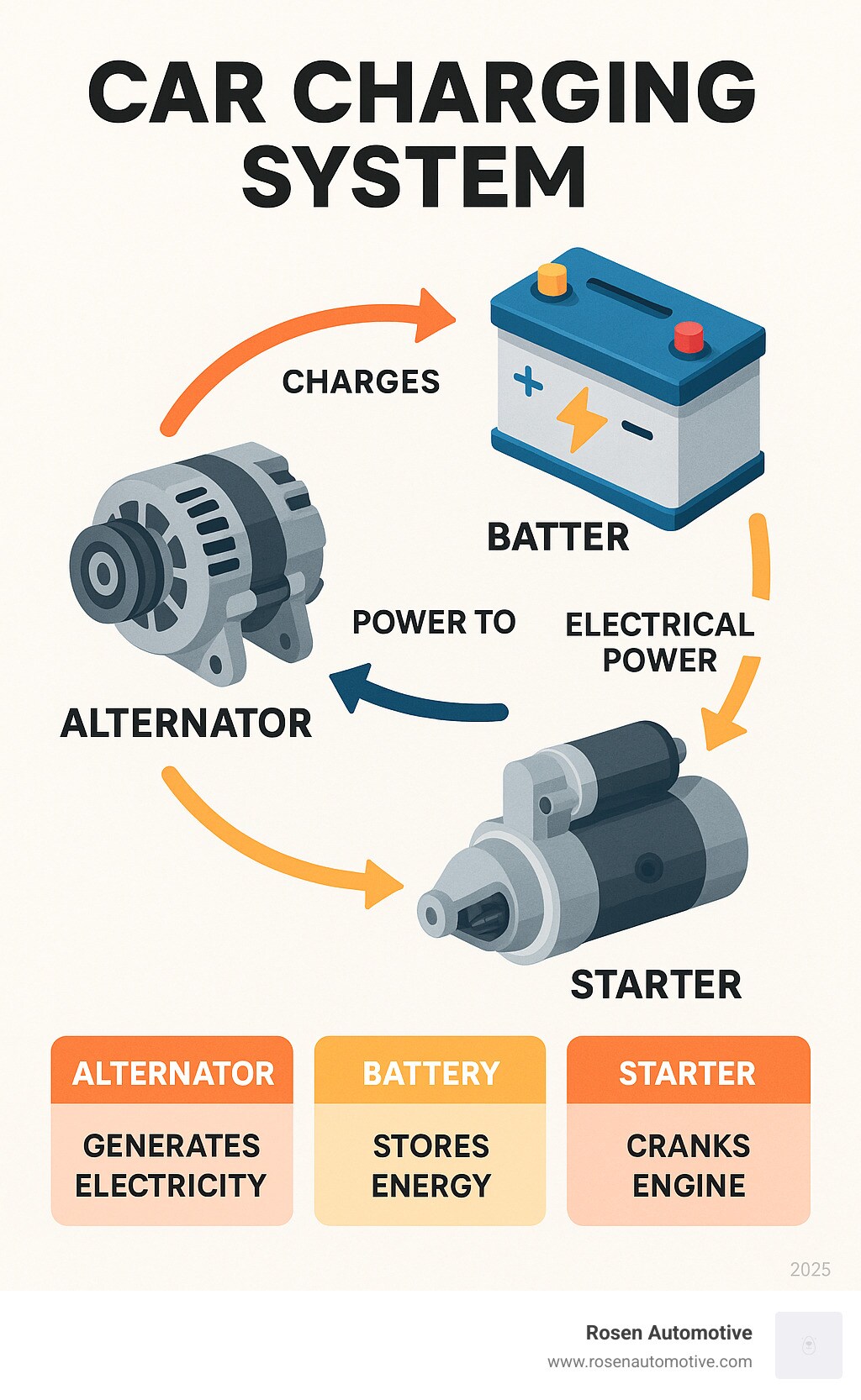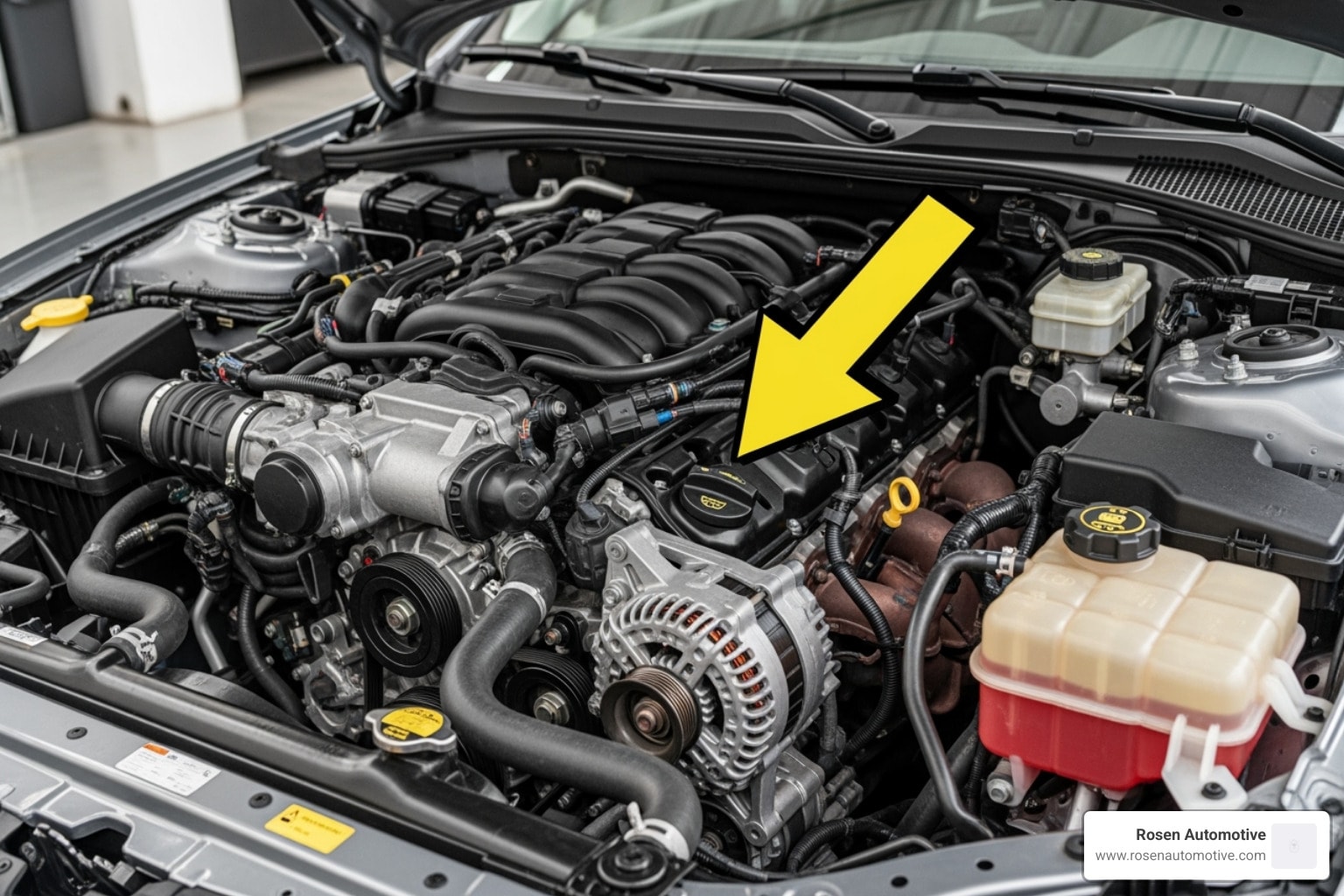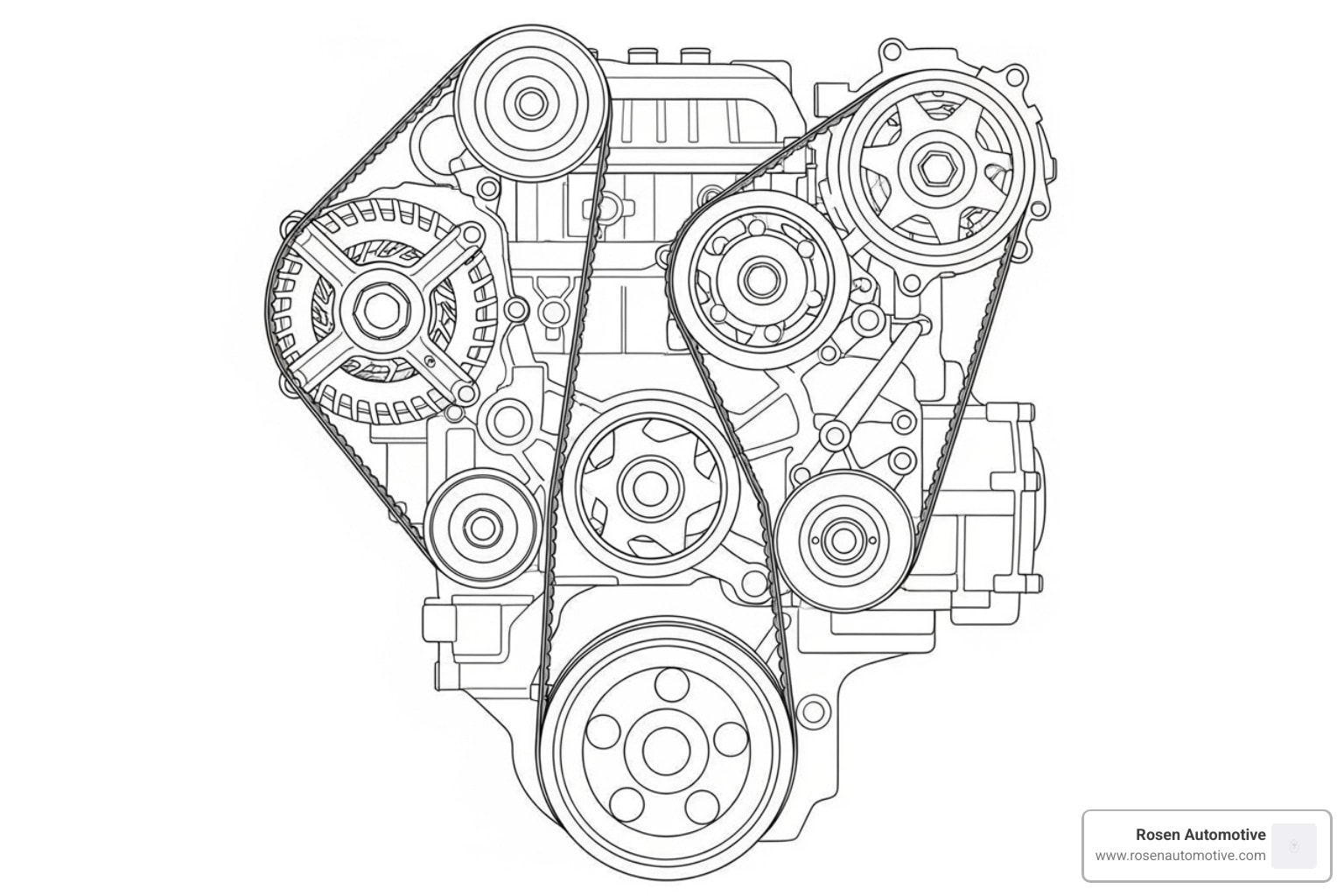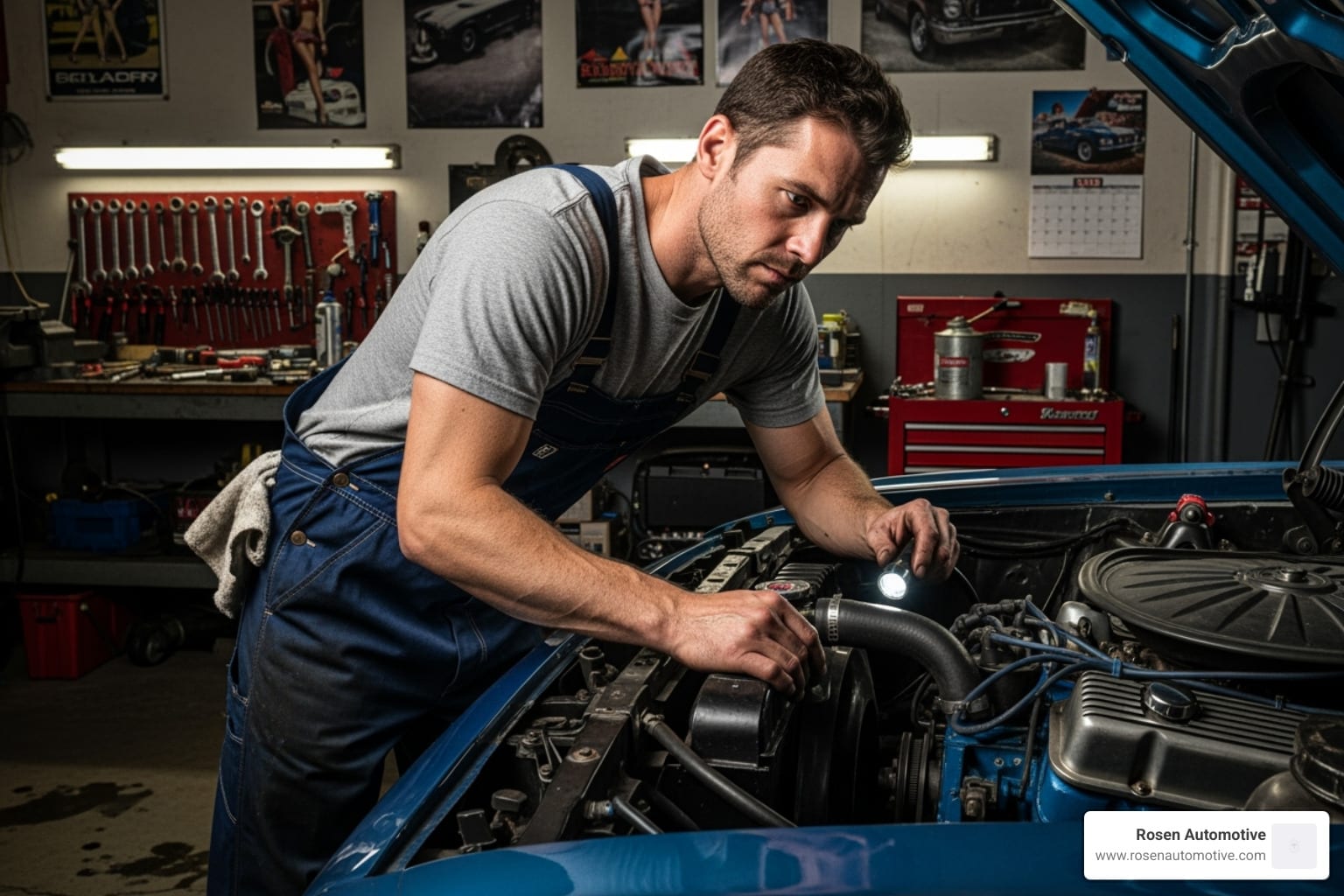Why a Functioning Alternator Is Critical for Your Vehicle
When you need alternator replacement near me, finding the right service provider quickly becomes essential for getting back on the road safely.
Quick Answer for Alternator Replacement Near Me:
- Dealership service centers offer certified technicians and genuine OEM parts
- Look for ASE-certified mechanics with experience in your vehicle’s make and model
- Get quotes from multiple locations to compare service options
- Check reviews and warranties before choosing a repair shop
- Consider brands like Ford, Honda, Nissan, Kia, and Hyundai for parts availability
Your car’s alternator is the powerhouse behind your vehicle’s electrical system. While your engine is running, this vital component charges your battery and powers everything from your headlights to your radio. When it fails, you’re not just looking at dim lights or a dead battery – you could find yourself stranded.
The research shows that common signs of alternator failure include dimming headlights, dashboard warning lights, frequent battery issues, and strange grinding or whining noises from the engine bay. If you’re experiencing any of these symptoms in your Ford, Nissan, Kia, Honda, or Hyundai, it’s time to act quickly.
This guide will help you understand when your alternator needs attention, how to find reliable repair services in Wisconsin, and what to expect from the replacement process. Whether you’re in Milwaukee, Madison, Greenfield, or Belleville, knowing where to turn for quality alternator service can save you time, money, and the frustration of unexpected breakdowns.

Is Your Alternator Failing? Key Symptoms to Watch For
Imagine cruising down the highway in your trusty Nissan, Honda, or Ford, only to notice your headlights start to dim, or your radio suddenly cuts out. These are often the first whispers of a struggling alternator. Understanding these early warning signs can save you from a complete breakdown and a lot of hassle.

Here are the common signs that your alternator might be failing and needs attention:
- Dimming or Flickering Lights: One of the most common and noticeable symptoms. If your headlights, dashboard lights, or interior lights appear dim, flicker, or brighten when you accelerate, it’s a strong indicator. This happens because the alternator isn’t consistently providing enough power to the electrical system.
- Dashboard Warning Light: Your car’s dashboard is designed to tell you when something is amiss. A ‘GEN’ (generator) light or a battery-shaped warning light will often illuminate if there’s an issue with the charging system. Don’t ignore this light, even if it comes on intermittently! It’s your car’s way of politely asking for help.
- Frequent Dead Battery: While a dead battery can be caused by many things, if your battery repeatedly dies, especially after you’ve recently charged it or had it tested and found it healthy, the culprit is likely your alternator. A faulty alternator simply isn’t recharging the battery as you drive, leaving it depleted.
- Strange Noises: Listen closely to your engine. A failing alternator can produce unusual sounds. You might hear a growling, whining, or grinding noise emanating from under the hood. This can be due to worn-out bearings inside the alternator or a loose, worn, or misaligned serpentine belt that drives the alternator. A squealing noise, for instance, often points to a worn or slipping belt.
- Burning Smell: A burning smell, similar to hot rubber or electrical wires, can signal an alternator problem. This could be due to an overworked or slipping serpentine belt getting too hot, or it might indicate overheating electrical components within the alternator itself. Neither is a good sign!
- Electrical Accessory Malfunctions: Since the alternator powers all your car’s electrical systems, its failure can affect everything from power windows and seats to the radio, air conditioning, and even the navigation system. If these accessories start acting erratically, slowing down, or failing altogether, it’s a red flag.
- Difficulty Starting or Stalling: If your alternator isn’t charging the battery, your car will eventually struggle to start or might stall while driving. Once the battery’s reserve power is depleted, the engine simply won’t have the electricity it needs to run.
Ignoring these symptoms can lead to you being stranded, often at the most inconvenient times. For instance, if you’re planning a road trip or just your daily commute in your reliable used SUV, you certainly don’t want to find yourself stuck on the side of the road. If you’re experiencing any of these issues, it’s crucial to have your vehicle inspected promptly. Explore reliable used SUVs on our website if you’re looking for a dependable vehicle that won’t leave you stranded: Explore reliable used SUVs
Understanding Your Car’s Charging System: Alternator, Battery, and Starter
Picture your car’s electrical system as a well-choreographed dance. Your alternator, battery, and starter work together in perfect harmony to keep you rolling down the road. When you’re searching for alternator replacement near me, understanding this teamwork helps you appreciate why getting it fixed quickly matters so much.
Think of your battery as the reliable friend who’s always ready to help when you need to start your car. The starter is like that burst of energy you need to get going in the morning. And your alternator? That’s the steady, dependable partner who keeps everything powered up once you’re on the move.
How the Alternator Powers Your Vehicle
Your alternator is honestly pretty amazing when you think about it. This hardworking component takes the spinning motion from your engine and transforms it into the electricity that powers everything from your headlights to your phone charger. Whether you’re driving a Honda, Nissan, Ford, Kia, or Hyundai, the basic principle remains the same.
The magic happens through several key components working together. The rotor spins inside the alternator, creating a magnetic field as it turns. This rotating electromagnet is surrounded by the stator, which contains copper wire windings that capture this magnetic energy and convert it into alternating current electricity.
But here’s where it gets interesting – your car actually needs direct current power, not alternating current. That’s where the rectifier comes in, containing diodes that flip that AC power into the DC electricity your vehicle craves. It’s like having a translator that makes sure everyone speaks the same electrical language.
The voltage regulator acts as the smart controller of this whole operation. It constantly monitors the electrical output and keeps everything between 13.5 and 14.8 volts, regardless of whether you’re idling at a stoplight or cruising on the highway. Without this component, your battery could get overcharged and damaged, or your electrical systems might not get enough power to function properly.
None of this would work without the serpentine belt that connects your alternator to your engine’s crankshaft. This single belt is like the conductor of an orchestra, keeping multiple components – including your alternator, power steering pump, and air conditioning compressor – all moving in sync.

Is It the Alternator or Something Else?
Here’s where things can get tricky. When your car won’t start or your electrical systems act up, it’s easy to point the finger at the wrong culprit. The symptoms of a failing alternator, dead battery, or bad starter can overlap in confusing ways.
If your car struggles to start and then dies shortly after, even with a jump start, you’re likely looking at alternator trouble. A failing alternator might get your engine running initially, but it can’t keep the battery charged, so your car will stall once the battery’s reserve power runs out.
Battery problems typically show up as a car that won’t crank at all or cranks very slowly. You might hear rapid clicking sounds, and your lights will be dim or completely dead. The good news? A dead battery usually doesn’t cause issues while you’re driving – only when starting.
Starter issues are often the loudest of the bunch. You’ll typically hear a loud click when you turn the key, but the engine won’t turn over. Sometimes you might get intermittent cranking or grinding noises. The interesting thing about starter problems is that your lights and electrical accessories usually work just fine.
| Symptom / Component | Bad Alternator | Bad Battery | Bad Starter |
|---|---|---|---|
| Starting the Car | Struggles to start or stalls while driving; may start with jump but die soon after. | Doesn’t crank or cranks very slowly; may click rapidly. | Loud click, but engine doesn’t turn over; inconsistent cranking. |
| Lights & Electrical | Dimming, flickering lights; electrical accessories malfunction while driving. | No lights or very dim lights; electricals dead. | Lights might work fine, but engine won’t crank. |
| Dashboard Warning | Battery light or ‘GEN’ light on. | No warning light (unless battery is very low). | No specific warning light for starter. |
| Noises | Whining, grinding, growling noises. | No specific noises from battery itself. | Loud click, grinding noise during cranking. |
| Burning Smell | Burning rubber or electrical smell. | No specific smell from battery. | Burning smell if starter motor is overheating. |
The tricky part is that these components depend on each other. A failing alternator will eventually kill your battery, and a weak battery can make your starter work harder than it should. That’s why professional diagnosis is so valuable – our technicians have the tools and experience to pinpoint exactly what’s causing your troubles, whether you’re driving a reliable Ford F-150 or a fuel-efficient Honda.
Don’t spend time guessing or swapping parts hoping to solve the problem. Our expert technicians can help you get to the bottom of your charging system issues quickly and accurately.
Your Guide to Finding an Alternator Replacement Near Me
When your Honda starts showing those telltale signs of alternator trouble, or your Nissan’s dashboard warning light comes on, finding the right service provider becomes your top priority. The question “where can I find alternator replacement near me?” suddenly becomes very important – and choosing the right answer can make all the difference in getting back on the road safely.
Finding a Reliable Mechanic for Alternator Replacement Near Me
Think about it: your alternator is the heart of your car’s electrical system. When it needs replacing, you want someone who really knows what they’re doing, not just someone who can swap parts. That’s where dealership service centers shine, and it’s exactly what we offer at Rosen Automotive across Wisconsin.
Dealership service benefits go far beyond what you might expect. Our service centers in Milwaukee, Madison, Greenfield, and Belleville aren’t just equipped with standard tools – we have specialized diagnostic equipment designed specifically for your vehicle’s make and model. Whether you’re driving a Ford F-150, a Honda CR-V, or a Kia Sorento, our equipment speaks your car’s language.
Our technicians bring something special to the table. They’re not just skilled mechanics; they’re factory-trained professionals who have passed rigorous exams covering all aspects of automotive repair, including those complex electrical systems that make modern cars tick. When you bring your Hyundai or Nissan to us, you’re getting someone who truly understands how your specific vehicle works.
Specialized training is where we really stand out. Our technicians receive ongoing education directly from Ford, Nissan, Kia, Honda, and Hyundai. This means they stay current with the latest technologies and repair procedures – especially important when you consider how sophisticated today’s charging systems have become. Your 2020 Honda Pilot’s alternator system is quite different from a 2015 model, and our technicians know those differences inside and out.
When it comes to parts, we use genuine OEM parts exclusively. Aftermarket alternatives might seem tempting from a budget standpoint, but OEM parts are designed and tested by your vehicle’s manufacturer to meet exact specifications. They’re built to last, and they come with the peace of mind that they’ll work perfectly with your car’s systems.
We don’t just replace your alternator and send you on your way, either. Our comprehensive approach means we’ll check your entire starting and charging system – alternator, battery, and starter working together. This helps us catch any other issues that might leave you stranded down the road.
Alternator Repair vs. Full Replacement
You might wonder if your failing alternator can be repaired instead of completely replaced. It’s a fair question, especially when you’re thinking about costs and trying to get the most value from your repair.
Repair would mean taking apart your alternator and replacing specific internal components like brushes, bearings, or other worn parts. Replacement means removing the entire faulty unit and installing a brand-new or professionally remanufactured alternator.
Here’s the reality: replacement is the standard approach, and for good reason. Modern alternators in vehicles like your Kia, Honda, or Ford are sophisticated units with many integrated components working in harmony. When an alternator starts failing, it’s rarely just one simple part that’s gone bad. Multiple internal components are usually showing wear, and trying to identify and replace each failing piece often costs more than a complete replacement.
More importantly, a full replacement gives you long-term reliability. Instead of wondering if that repaired alternator will fail again in six months, you get the confidence that comes with a complete, fresh unit. We’re in the business of solving problems for good, not creating temporary fixes that leave you worried about your next breakdown.
What Factors Influence Alternator Replacement Cost?
Understanding what goes into alternator replacement costs helps you make informed decisions and budget appropriately. While we can’t quote specific prices here – costs vary based on your particular vehicle and current market conditions – we can walk you through the key factors that influence what you’ll pay.
Vehicle make and model plays the biggest role in determining cost. The alternator for a robust Ford F-150 truck has different specifications and complexity compared to a compact Honda Civic. Some vehicles simply require more powerful or sophisticated alternators, and some are engineered in ways that make the parts more expensive to manufacture.
Part costs vary significantly depending on your specific vehicle and the type of alternator it needs. OEM parts – which we recommend for their guaranteed fit and quality – are priced by the manufacturer based on the complexity and specifications required for each vehicle model.
Labor time can swing widely depending on your car’s design. On some vehicles, the alternator sits right where you can see it, making replacement straightforward. On others, it might be tucked away behind other components, requiring removal of cooling fans, suspension parts, or other systems just to reach it. More complex access naturally means more labor hours.
Sometimes additional parts or services make sense during alternator replacement. If your serpentine belt is showing wear, replacing it during alternator service saves you a return trip later. Similarly, corroded battery cables or worn electrical connections might need attention to ensure your new alternator works properly.
If you’re considering your options and thinking about whether repair is worth it versus finding a different vehicle, take a look at our selection of Used Ford F-150 trucks for reliable transportation.
For an accurate quote custom to your specific vehicle and situation, we encourage you to Schedule a service appointment for a quote with us. That way, we can give you real numbers based on your actual needs.
Proactive Care: How to Extend the Life of Your Alternator
Think of your alternator like a hardworking friend who never complains – until suddenly, they can’t keep up anymore. The good news? With a little attention and care, you can help your alternator live a long, productive life and avoid those dreaded roadside breakdowns.

Regular inspections are your first line of defense. When you bring your Ford, Nissan, Kia, Honda, or Hyundai in for routine maintenance, our technicians can spot potential trouble before it becomes a major headache. We’ll check for signs of wear, corrosion, or damage that could lead to alternator failure down the road.
Your serpentine belt deserves special attention since it’s what keeps your alternator spinning. This single belt works incredibly hard, powering not just your alternator but also your power steering and air conditioning. If it’s cracked, frayed, or starting to look glazed over, it’s time for a replacement. A worn belt can slip, making your alternator work less efficiently and wearing it out faster. The good news is that belt replacement is relatively inexpensive compared to alternator replacement near me services.
Battery condition plays a bigger role than many people realize. When your battery starts to weaken with age, your alternator has to work overtime to keep it charged. It’s like asking someone to fill a bucket with a hole in the bottom – exhausting and ultimately futile. Regular battery testing helps ensure your alternator isn’t shouldering an unfair burden.
Here’s something that might surprise you: avoid overloading your electrical system. We know it’s tempting to add that powerful sound system or extra lighting to your vehicle, but every electrical accessory draws power. If you’ve made significant electrical modifications to your Honda CR-V or Ford F-150, consider whether your alternator can handle the extra demand without burning out prematurely.
Most importantly, address warning lights promptly. When that battery light flickers on your dashboard, your car is trying to tell you something important. Ignoring it is like ignoring a friend who’s asking for help – eventually, they might not be able to help you when you need them most.
By staying on top of these maintenance basics and following your manufacturer’s recommended service schedule, you’re investing in your vehicle’s long-term reliability. It’s much easier to replace a serpentine belt during routine maintenance than to deal with alternator failure during your morning commute. Follow your manufacturer-recommended service schedule
Your Trusted Partner for Auto Service in Wisconsin
Understanding your alternator and recognizing when it needs attention can save you from unexpected breakdowns and costly repairs. As we’ve explored throughout this guide, your alternator is truly the powerhouse behind your vehicle’s electrical system, keeping everything from your headlights to your radio running smoothly.
When you’re searching for alternator replacement near me in Wisconsin, you deserve a service partner who combines expertise with genuine care for your vehicle. At Rosen Automotive, we’ve built our reputation on providing exceptional automotive service across our locations in Milwaukee, Madison, Greenfield, and Belleville.
Our certified technicians bring specialized training and years of experience to every alternator diagnosis and replacement. Whether you drive a Ford, Nissan, Kia, Honda, or Hyundai, our team has the knowledge and tools to get your charging system back to peak performance.
We believe in doing the job right the first time. That’s why we use genuine OEM parts whenever possible, ensuring your vehicle receives components designed specifically for optimal performance and longevity. These aren’t just parts that fit – they’re parts that were engineered to work seamlessly with your vehicle’s systems.
Sometimes, however, extensive repairs might not be the most practical path forward. If your vehicle is facing multiple costly issues, or if you’re simply ready for the reliability and peace of mind that comes with a newer vehicle, we’re here to help with that too. Our dealerships offer an excellent selection of new Ford, Nissan, Kia, Honda, and Hyundai models, plus a carefully inspected inventory of reliable used vehicles.
Don’t wait until you’re stranded with a dead battery on a busy Wisconsin highway. If you’ve noticed dimming lights, heard unusual noises from under the hood, or seen that warning light flicker on your dashboard, it’s time to take action.
Our team is ready to perform a comprehensive charging system inspection, accurately diagnose any issues, and provide you with honest recommendations for getting your vehicle back to reliable operation. We’re not just fixing your car – we’re helping ensure you can count on it for all the miles ahead.
Schedule your alternator inspection with Rosen Automotive today and experience the difference that expertise, quality parts, and genuine customer care can make for your vehicle’s performance and your peace of mind.
